Key takeaways:
- Rejection serves as a catalyst for personal growth, prompting reflection and improvement in skills.
- Feedback from rejection letters often highlights areas for development, guiding future endeavors and fostering resilience.
- Rejections can lead to unexpected opportunities and connections, transforming setbacks into pathways for success.
- Practicing self-compassion and gratitude helps in reframing negative experiences, enhancing a resilient mindset.
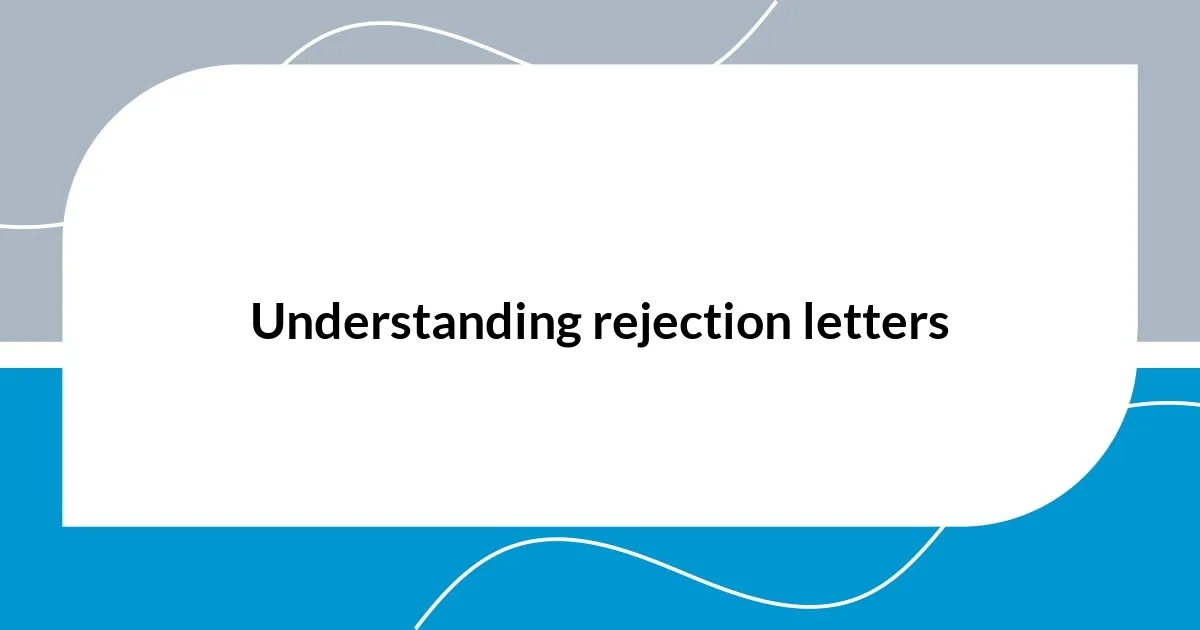
Understanding rejection letters
Rejection letters can feel like a punch to the gut, can’t they? I remember the first time I received one; it stung more than I expected. In that moment, I realized that a rejection is often more about the circumstances than my abilities, reminding me that fit and timing play crucial roles in any opportunity.
What I’ve grown to appreciate about rejection letters is that they can actually provide valuable insights. Sometimes, they offer feedback that highlights areas for improvement, and other times, they simply reaffirm the idea that the right match is still out there waiting for me. How many times have I looked back on those letters and found lessons that propelled my growth forward?
Interestingly, each rejection has its own story, and I’ve come to see them as stepping stones rather than setbacks. Each letter reminds me that the journey is just as important as the destination. When I think of it this way, I can’t help but wonder: what doors might open next due to the resilience I’m developing?
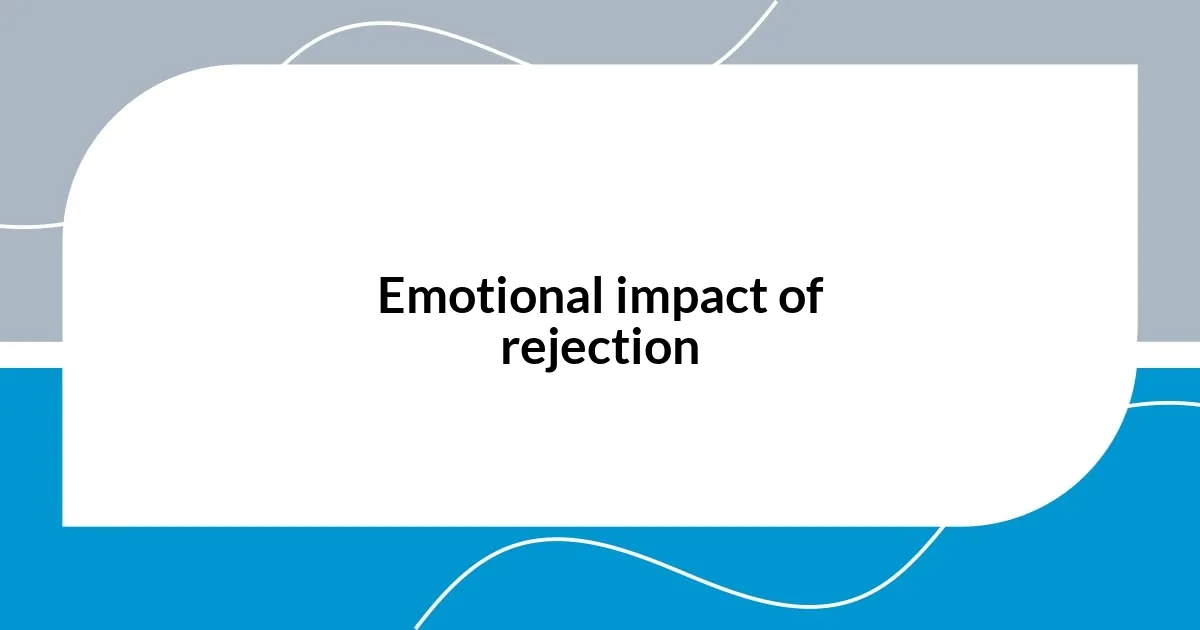
Emotional impact of rejection
Rejection can trigger a whirlwind of emotions. I’ve seen it turn my confidence into doubt in just a few words. I once received a rejection email for a position I was really excited about. Initially, my heart sank, and I could feel that familiar sense of inadequacy creeping in. It took me time to realize that rejection isn’t a reflection of my worth; it simply indicates that the alignment wasn’t right at that moment.
The emotional impact can manifest in different ways, creating a complex web of feelings. Here are some common reactions I’ve experienced and observed in others:
- Sadness: It’s a natural response, often leaving us feeling let down.
- Frustration: I find disappointment can morph into irritation at the whole process.
- Self-doubt: I’m not alone in questioning my capabilities or decisions after receiving a rejection.
- Motivation: Interestingly, rejection can ignite a fire in me, pushing me to improve and try again.
- Reflection: It often leads me to assess what I really want and where I might need to grow.
In this way, while rejection can hurt, it also serves as a catalyst for personal growth and deeper self-understanding.
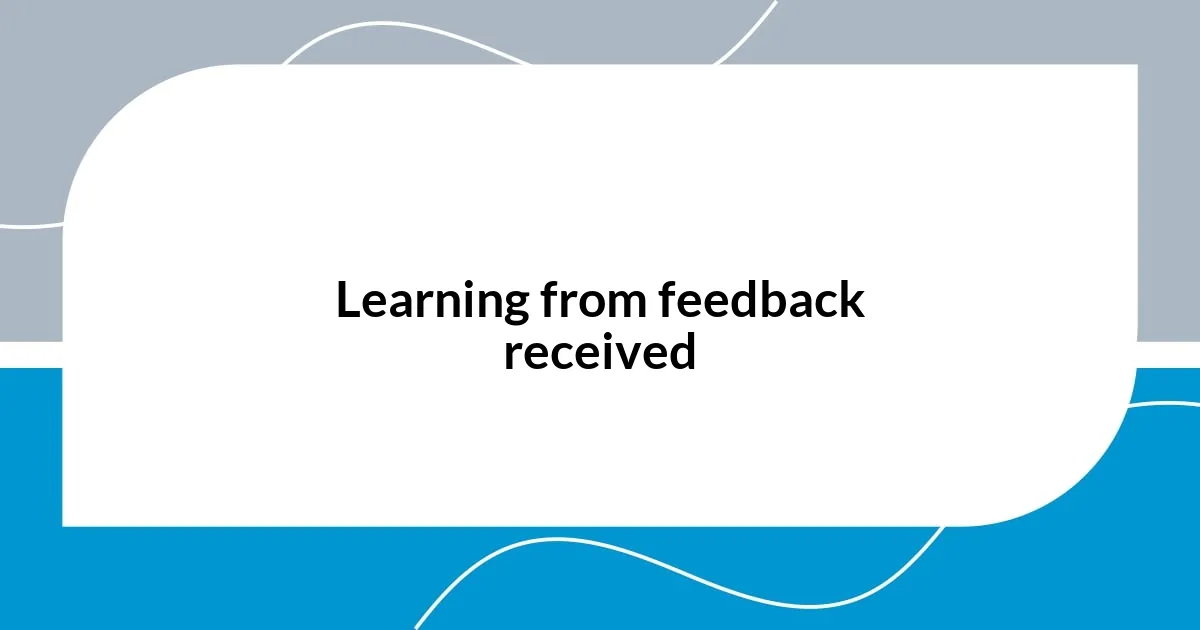
Learning from feedback received
Feedback from rejection letters often becomes a treasure trove of lessons. I recall receiving a rejection that included specific comments about my project proposal. At first, I was disheartened, but I chose to dissect the feedback instead. This approach allowed me to understand exactly where my argument fell flat, and I used that knowledge to shape stronger proposals in the future. It’s incredible how constructive criticism, even when wrapped in disappointment, can steer us in the right direction.
Consider how feedback serves as a mirror reflecting our strengths and weaknesses. A few years ago, a rejection from an opportunity I really coveted contained observations about my presentation skills. While it initially bruised my ego, I soon realized that this was my chance to refine those skills. I enrolled in a public speaking course and discovered that helping others with their presentations became a passionate side project for me. Sometimes, the feedback we receive can spark unexpected new paths in our lives.
Finally, I find it essential to remember that the process of receiving feedback is about growth, not just evaluation. Just the other day, I reflected on a rejection from a writing competition. The feedback pointed out areas where my writing lacked clarity. It stung at first, but I took it to heart, reviewing my work with fresh eyes. Now, every new piece I write carries the scent of that constructive feedback, guiding my revisions. With this mindset, I continually evolve, striving to be the best version of myself.
| Feedback Type | Personal Impact |
|---|---|
| Constructive Criticism | Drives Improvement |
| General Feedback | Inspires Reflection |
| Emotional Observations | Encourages Growth |
| Opportunities for Growth | Leads to New Paths |
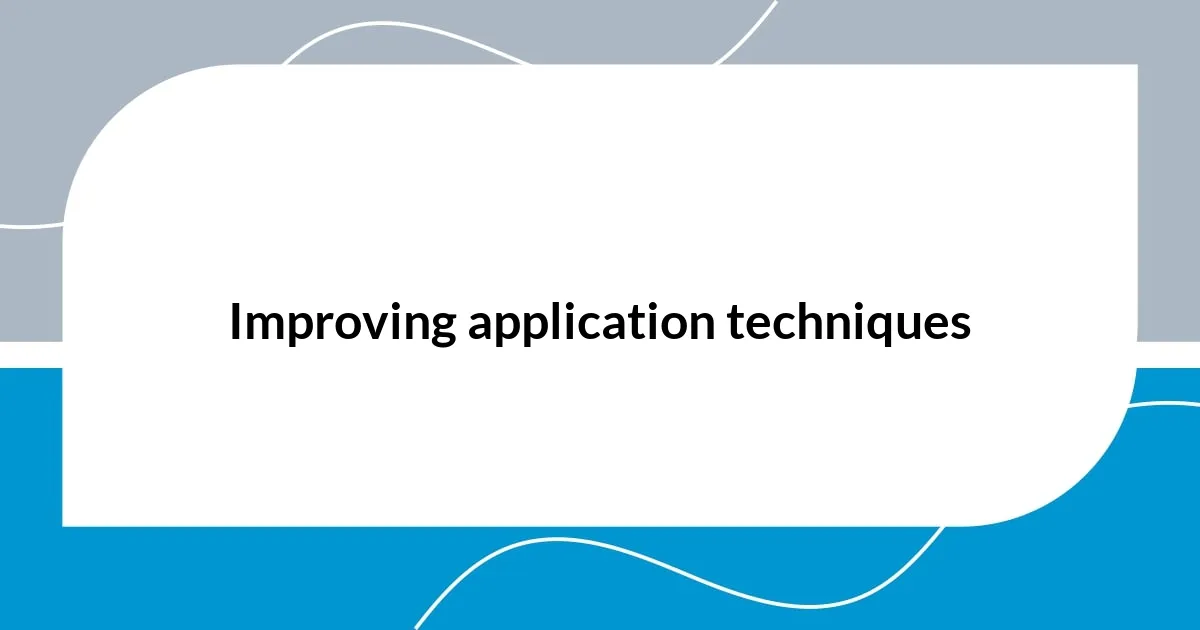
Improving application techniques
Developing effective application techniques is key to navigating the challenging waters of job searching. I remember revamping my resume after receiving a series of rejections. It wasn’t merely about slapping on keywords; I took time to genuinely reflect on my experiences. Each bullet point became a story I wanted to tell—did I share my unique contributions? Absolutely! By personalizing my approach, I not only felt more confident but also increased my chances of landing interviews.
One technique I found invaluable is tailoring my cover letter to resonate with each organization’s values. I once drafted a cover letter that closely mirrored a company’s mission statement, showing my genuine interest in their work. The connection I forged made me feel like I was already part of their team before even stepping into an interview. Have you ever considered how a well-crafted cover letter can differentiate you from other candidates? It truly can turn the tides in your favor.
Experimenting with different formats can also lead to breakthroughs. I decided to film a video introduction for a position I was passionate about. It felt risky at first, but capturing my enthusiasm and personality set me apart from traditional applications. Engaging potential employers in a unique way can be a game-changer. What risks have you taken in your application process? Often, the boldest choices yield the most rewarding outcomes.
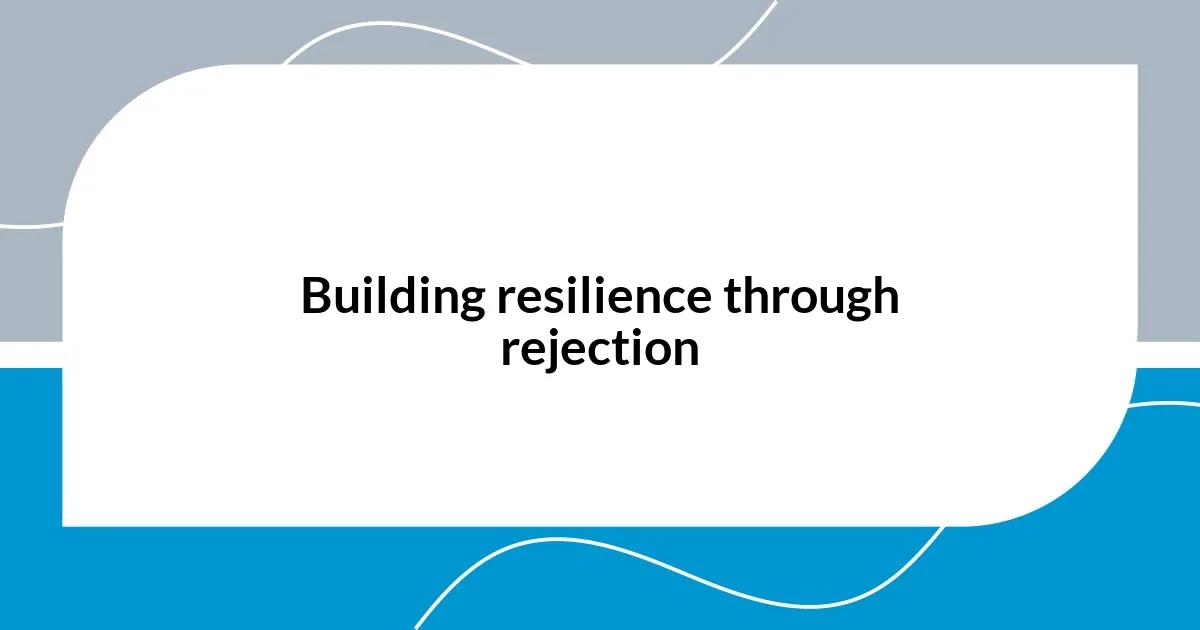
Building resilience through rejection
Building resilience through rejection can truly transform how we approach both our personal and professional lives. I once received a rejection that felt like a punch to the gut. Instead of wallowing in disappointment, I decided to channel that energy into a fitness challenge. It was amazing how physical endurance translated into mental toughness. When faced with setbacks, training became my sanctuary, teaching me that each struggle could make me stronger.
I also remember a time when I was turned down for a mentorship program I desperately wanted to join. It hurt at first, but I took it as a cue to seek feedback directly. My mentor at the time encouraged me to gather insights from others. That conversation opened doors to a wonderful network of supportive peers. Have you ever thought about how one rejection can sometimes lead to unexpected connections? Embracing those moments helped me build a safety net of relationships, which reinforced my resilience.
Rejection, especially in creative fields, can feel intensely personal. I recall a particularly painful rejection from a gallery exhibition that really stung. It made me question my artistic abilities. Yet, reflecting on the experience pushed me to experiment with different styles and techniques, expanding my creative voice. The journey taught me that resilience is not just about bouncing back; it’s about evolving. How do you think rejection has shaped your own creative journey? For me, every experience sharpened my focus and fueled an unwavering drive to keep creating.
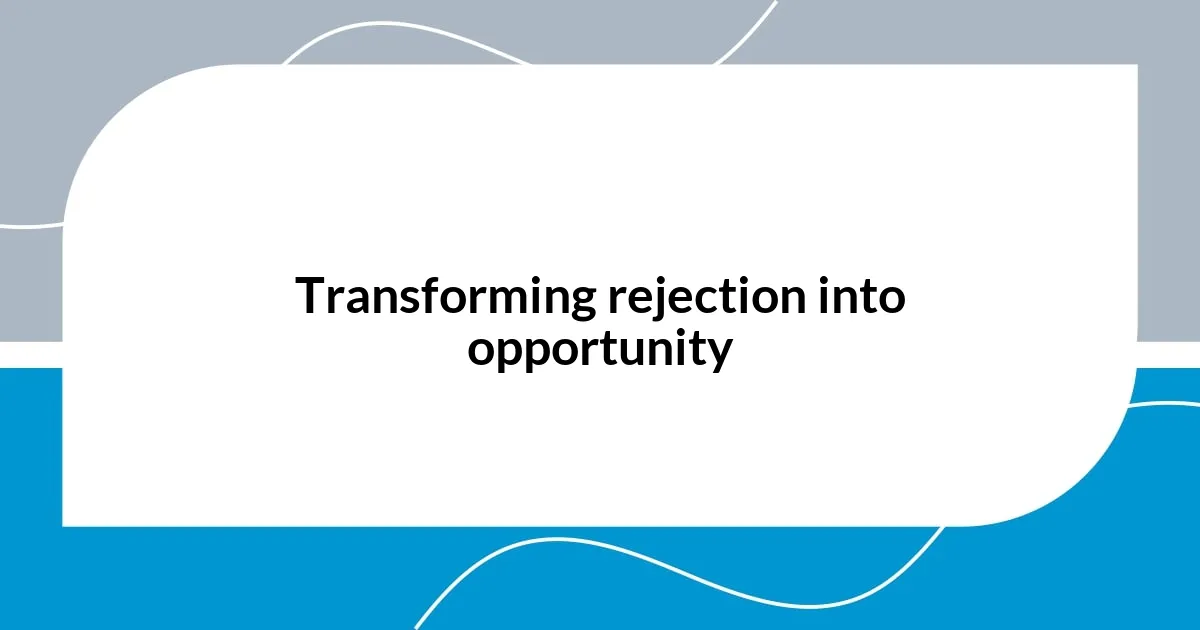
Transforming rejection into opportunity
Sometimes, rejection can feel like a door slamming in your face, but I’ve found it can also be a doorway to new and unexpected paths. When I received a rejection from a project I was passionate about, I took a moment to step back and reassess my approach. Instead of giving up, I reflected on my motivations and values, which led me to explore an entirely different project that not only reignited my passion but also aligned more closely with my authentic self. Isn’t it fascinating how a setback can direct us toward something more fulfilling?
I vividly remember how one particular rejection pushed me to network outside my comfort zone. Initially, I felt embarrassed to reach out to others about my recent disappointment. However, when I finally did, I was amazed at the warm responses I received. One stranger even offered to introduce me to their connections, which resulted in an invitation to a workshop that changed my perspective entirely. It made me realize that sometimes, the connections we establish after a rejection can lead us to opportunities we never knew existed. Have you ever reached out following a setback? The courage to connect can transform your trajectory.
Another significant lesson I learned through rejection is the importance of self-compassion. I recall a time when a rejection letter left me questioning my worth. Instead of harboring negative thoughts, I decided to start a gratitude journal, reflecting on my strengths and the progress I had made. Every entry became a reminder that each rejection was not a reflection of my value but an opportunity to grow. How do you practice self-compassion when faced with disappointment? For me, shifting my inner dialogue helped me cultivate a more resilient mindset, ready to embrace the possibilities ahead.
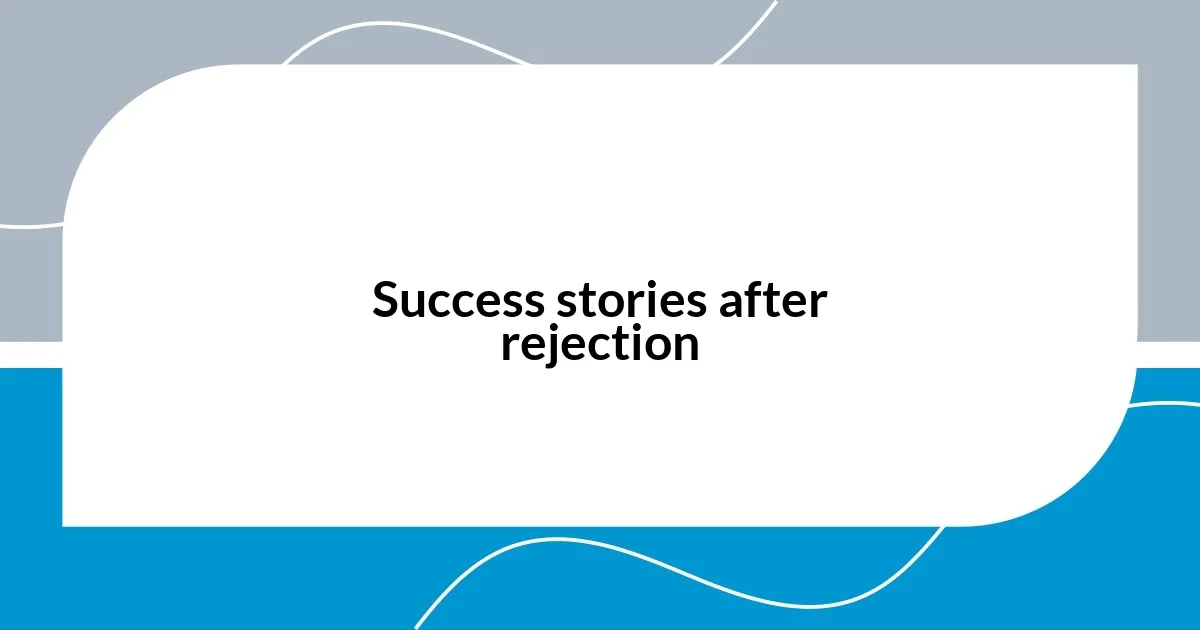
Success stories after rejection
Receiving a rejection can sometimes feel like the end of the road, but I’ve learned it’s often just the beginning. After I was turned down for an important grant, I felt a wave of disappointment wash over me. Instead of sulking, I decided to take a different course by diving deeper into my research, ultimately leading to a breakthrough that not only gave me a new project but also attracted attention from potential collaborators. Have you ever felt like you turned rejection on its head?
There was a time when I pitched an article to a prominent magazine and got a rejection that pierced my confidence. I must admit, it stung. However, reflecting on that experience pushed me to refine my skills. I started a blog where I practiced and shared my writing regularly, which eventually caught the eye of an editor who loved my style. That little blog became a stepping stone to being published in larger publications. Isn’t it amazing how a single “no” can redirect your path toward unexpected success?
Another significant moment came when I faced rejection in my early job applications. I remember tirelessly sending out resumes, only to get a string of ‘no thank you’ replies. Instead of feeling defeated, I organized a coffee meetup with friends in similar situations, and we began to share tips and leads. This collaboration not only led to new job opportunities but also deepened friendships. Have you ever noticed how community support can bloom out of shared setbacks? Through that experience, I learned that rejection doesn’t diminish our worth; it often leads us toward stronger connections and new beginnings.